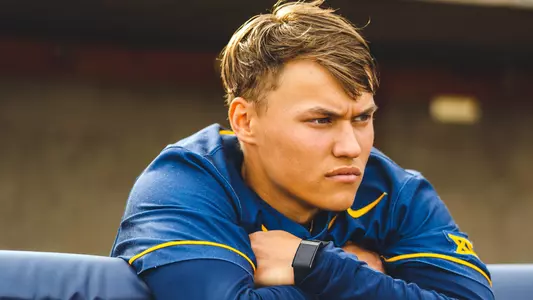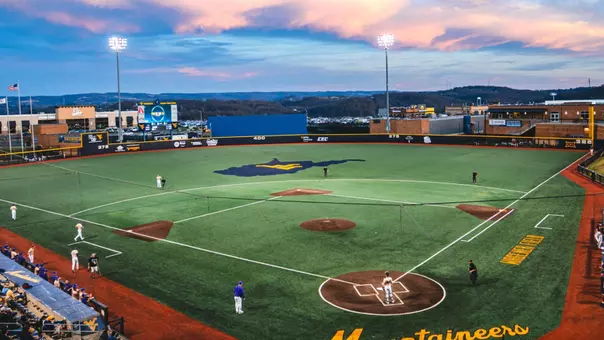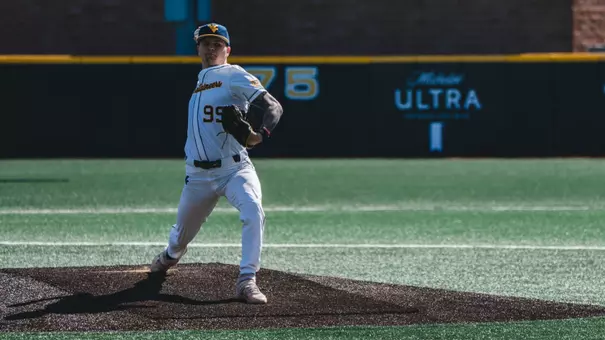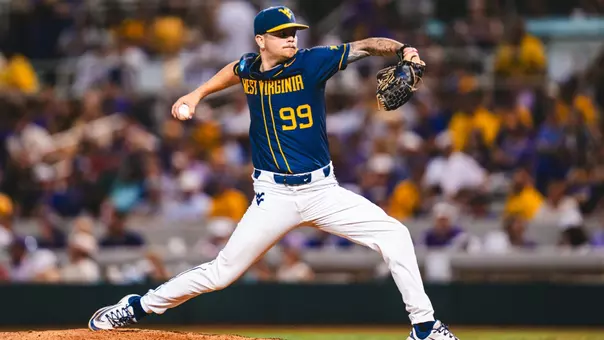
Photo by: WVU Athletic Communications
College Baseball Authority Fitt Impressed With 12th-Ranked Mountaineers
May 09, 2023 11:49 AM | Baseball, Blog
 MORGANTOWN, W.Va. - Aaron Fitt, managing editor for D1Baseball.com, is one of the prominent voices in college baseball today. He will be attending his 16th College World Series in Omaha, Nebraska, next month and has been a regular contributor to ESPN's Major League Draft coverage.
MORGANTOWN, W.Va. - Aaron Fitt, managing editor for D1Baseball.com, is one of the prominent voices in college baseball today. He will be attending his 16th College World Series in Omaha, Nebraska, next month and has been a regular contributor to ESPN's Major League Draft coverage.He used to write for Baseball America and calls Durham, North Carolina, his home. His contacts in college and professional baseball are extensive, so what Fitt has to say about Randy Mazey's 12th-ranked West Virginia University baseball team is worth noting.
"I think they are clearly the best team in the league (Big 12)," he said yesterday. "They've separated themselves from everybody else and kind of emerged as a very strong candidate to host a regional and make a run at one of those top-eight national seeds.
"It was a team that we liked at the beginning of the year that I think has played above everyone's expectations," he said. "It seems like they have a pretty dynamic roster, and a team that can beat you a lot of different ways. Obviously, the running game is a big part of it, and that makes the team very exciting. I've been very impressed, really, with the way the whole season has come together for them."
Without question, sophomore second baseman JJ Wetherholt has developed into one of the best players in the country. His high school profile coming out of Mars, Pennsylvania, wasn't great, and Fitt admits he didn't know much about him until he arrived at West Virginia.
Wetherholt had offers from Pitt and Penn State, but the traditional southern powers didn't know much about him because he wasn't playing in a bunch of showcases. He wanted to play a lot of games, which is how WVU assistant coach Steve Sabins discovered him playing in Philippi, West Virginia.
Sabins said he took his father with him that afternoon and JJ made a diving play down the right field line from his second base position that his dad still talks about today. Actually, Wetherholt wasn't even playing shortstop, which is where the best athletes in high school usually play.
But as of Monday, the 5-foot-10, 190-pounder leads the country with a .463 batting average, one point better than LSU's Dylan Crews, whom, incidentally, Sabins was the first college coach to offer a scholarship when Crews was still an eighth grader. Can you imagine a West Virginia lineup that would have included Wetherholt and Crews?
Nevertheless, Fitt said he is impressed with Wetherholt's amazing development in just two college seasons at WVU.
"For him to become the star that he is, I mean he's one of the best players in the country. He's a no-doubt, first team All-American. The season that he's had is absurd. It's a fantastic story," he said.
Jedd Gyorko is Mountaineer baseball's gold standard when it comes to hitting, but Fitt doesn't hesitate to put Wetherholt in that category.
"I remember watching Gyorko thinking he was another Kevin Youkilis-type build. He was just a guy who could hit. He was a bat, but (Wetherholt) is a bat who is also an impressive athlete," Fitt explained. "He has, what, 33 steals in 37 tries … while also hitting for power and batting .463? If it wasn't for Dylan Crews, you feel like he is a Golden Spikes Award winner – and he might be by the time it's all said and done. You just can't pick a hole in the season he's had. He's done everything."
Fitt says what sets this year's lineup apart from some of the others Mazey has had is the power sprinkled throughout. Wetherholt leads the way with 13 home runs, while sophomore Grant Hussey has 11, senior Caleb McNeely shows 10 and junior Landon Wallace recently hit his ninth.
As a team, West Virginia has 65 home runs and 110 stolen bases in 48 games, making it one of the most versatile lineups in college baseball. Defensively, Tevin Tucker is one of the best shortstops in the country, centerfielder Braden Barry can run down balls in the gaps and catcher Dayne Leonard has thrown out eight of 11 base stealers, which demonstrates the Mountaineers' strength up the middle.
"It just feels like they've got a really good blend," Fitt explained. "They hit for average; they hit for power, and they steal bases. In an ideal world, I think they would love to build their teams with all of those things, but it doesn't always happen that way. I didn't necessarily see this coming. We knew, certainly, Hussey had power, but having four guys with nine home runs or more, that's pretty good. They're multi-dimensional."
The one reservation Fitt has about West Virginia this season is the lack of a dominant, game-one starter such as Harrison Musgrave, Alek Manoah or Jackson Wolf – elite arms Mazey has had here in the past.
However, this is a very solid staff that Mazey has been able to maximize. Twelve different pitchers make up West Virginia's 36 victories so far this year.
 "We love (Ben) Hampton and (Blaine) Traxel. Traxel is fun," Fitt said. "He's really a fun pitcher who competes his tail off, and he's got some swagger out there. And Hampton is a very solid, reliable guy, but it doesn't feel like they've got that true, shutdown guy. They don't have a Paul Skenes or a Rhett Lowder at the top like LSU or Wake Forest have, but there aren't a ton of those guys to go around.
"We love (Ben) Hampton and (Blaine) Traxel. Traxel is fun," Fitt said. "He's really a fun pitcher who competes his tail off, and he's got some swagger out there. And Hampton is a very solid, reliable guy, but it doesn't feel like they've got that true, shutdown guy. They don't have a Paul Skenes or a Rhett Lowder at the top like LSU or Wake Forest have, but there aren't a ton of those guys to go around."I think you can certainly win a regional and get to Omaha with the kind of staff that they have, especially with their dynamic offense," Fitt added, noting junior reliever Carlson Reed is currently WVU's best pro prospect.
"I had a scout just the other day telling me how good that guy is with an elite slider – one of the best in the country – with a good fastball. He's performed too. The numbers back that up," Fitt said.
When you include a good nucleus of freshman players, Fitt believes continued success is sustainable for Mazey and his impressive coaching staff, which includes Sabins, Mark Ginther and Jacob Garcia.
"Coach Sabins is really a superstar. He's done a great job with their recruiting and developmental pieces," he said. "That program is just humming along. It's one thing to have a year when you jump up and you host a regional and then you fall back and don't build upon it, but to be in this situation again just years later is huge for them. They can host again, and if they can get past the regional, they have staying power."
Fitt continued.
"If you look at the conferences with the northern wing or geographic outliers, Boston College had their great year in 2016 going to a Super Regional, and I don't think they've been to a regional since until they go again this year."
Fitt listed Connecticut and Maryland as two other programs on the rise from this part of the country, but they are playing in conferences against peers with similar climates. In the case of Maryland, the Terps are located in one of the better climates in the Big Ten.
West Virginia, Boston College, Notre Dame and Kentucky have enjoyed success playing in power conferences with their climate challenges.
"In the Big 12, you're mostly playing with warmer weather powers. In the SEC, Kentucky hasn't been good in a while and all of a sudden this year they are. It's hard for the Notre Dames and the Kentuckys to do it regularly when you are facing a bunch of southern teams," Fitt explained. "If you are facing a bunch of Texas teams, and you're up there in Morgantown, the realities that you are facing are a lot different than Maryland, which has some of the best weather in the Big Ten.
"That's just the reality in this sport," he added. "Weather matters, and it makes it a lot harder when you are in a cold weather place and the season starts in mid-February."
However, Fitt doesn't think West Virginia is going away anytime soon, as long as Mazey is overseeing the program.
"Sure, there are going to be some ups and downs. It might not be an every-year regional team, but that 2019 team was not an aberration. The possibility of hosting twice in four years is pretty cool. That's not easy to do, especially for a program up in that part of the country," he concluded.
Players Mentioned
OF
/ Baseball1B
/ BaseballC/INF
/ BaseballINF
/ BaseballRHP
/ BaseballINF
/ BaseballOF
/ BaseballINF
/ BaseballTV Highlights: WVU 59, Cincinnati 54TV Highlights: WVU 59, Cincinnati 54
Friday, February 06
Ross Hodge, Honor Huff & D.J. Thomas | Cincinnati PostgameRoss Hodge, Honor Huff & D.J. Thomas | Cincinnati Postgame
Friday, February 06
Mark Kellogg | Feb. 4Mark Kellogg | Feb. 4
Thursday, February 05
United Bank Playbook: Cincinnati PreviewUnited Bank Playbook: Cincinnati Preview
Wednesday, February 04






















